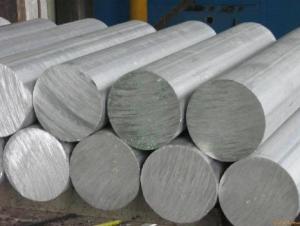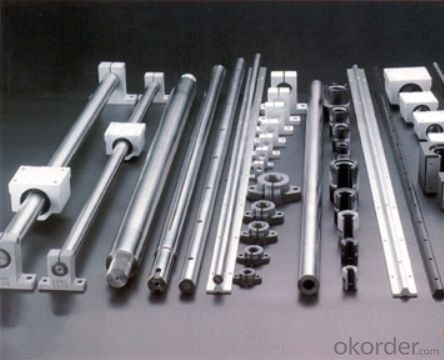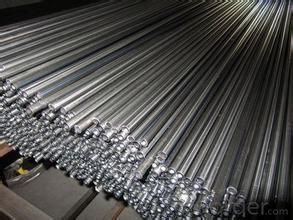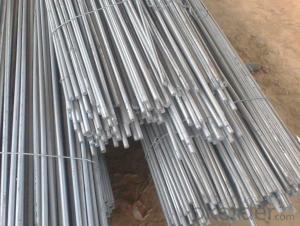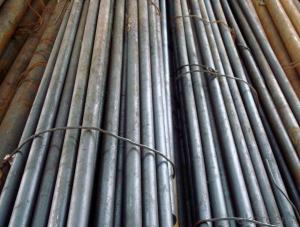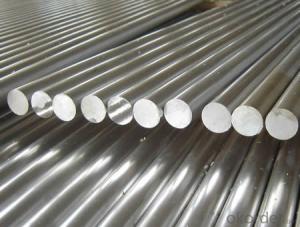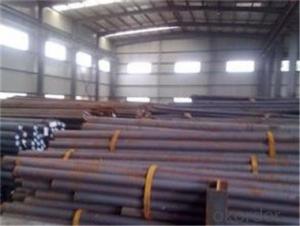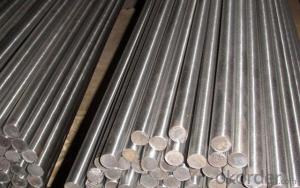Hot Rolled Spring Steel Round Bar 18mm with High Quality
- Loading Port:
- Shanghai
- Payment Terms:
- TT or LC
- Min Order Qty:
- 20 m.t.
- Supply Capability:
- 500 m.t./month
OKorder Service Pledge
OKorder Financial Service
You Might Also Like
Product Description:
OKorder is offering Hot Rolled Spring Steel Round Bar 18mm with High Quality at great prices with worldwide shipping. Our supplier is a world-class manufacturer of steel, with our products utilized the world over. OKorder annually supplies products to European, North American and Asian markets. We provide quotations within 24 hours of receiving an inquiry and guarantee competitive prices.
Product Applications:
Hot Rolled Spring Steel Round Bar 18mm with High Quality is widely used to make the bearing used in automobile, tractor engine, transmission and the wheel. And it also used to make the main bearing for the machine tools, electrical machinery, mining machinery, electric locomotives,mechanical ventilation and high speed of grinding wheel spindle etc
Product Advantages:
OKorder's Hot Rolled Spring Steel Round Bar 18mm with High Quality are durable, diversified and qualified.
Main Product Features:
· Premium quality
· Prompt delivery & seaworthy packing (30 days after receiving deposit)
· Can be recycled and reused
· Mill test certification
· Professional Service
· Competitive pricing
Product Specifications:
Manufacture: Hot rolled
Grade: 20CrNiMoA 20CrNi2MoA 16Cr2Ni4MoA 12Cr2Ni3Mo5A 20Cr2Ni4A 20Cr2Ni2MoA
Cr4Mo4V Cr15Mo4
Certificates: ISO, SGS, BV, CIQ
Length:6m 8m 9m 12m
Packaging: Packed in bundles with standard export sea-worthy package or as customer require
FAQ:
Q1: How soon can we receive the product after purchase?
A1: Within three days of placing an order, we will begin production. The specific shipping date is dependent upon international and government factors, but is typically 7 to 10 workdays.
Q1: How many types of bearing steel that OKorder.com can supply?
A2: Two types, carbon spring steel and alloy spring steel
Images:
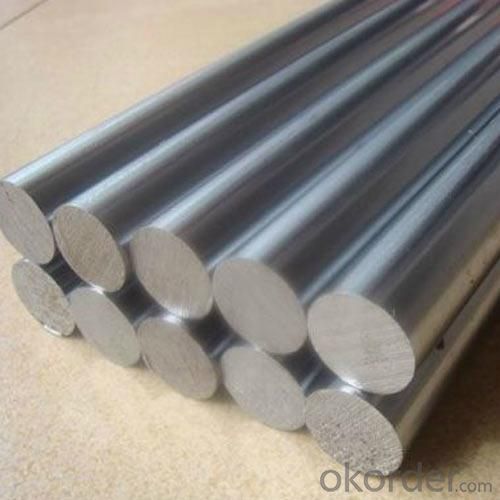
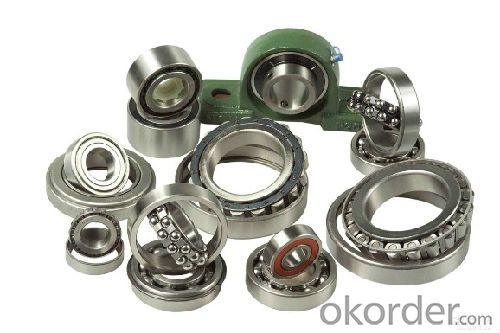
- Q: How does special steel contribute to the energy industry?
- Special steel contributes to the energy industry in various ways. It is widely used in the manufacturing of turbines, generators, and other critical components for power plants. Its high strength, durability, and corrosion resistance properties make it suitable for withstanding the extreme conditions found in power generation facilities. Additionally, special steel plays a crucial role in the production of pipelines and storage tanks for the oil and gas sector, ensuring the safe and efficient transportation and storage of energy resources. Overall, special steel enhances the reliability and efficiency of energy infrastructure, supporting the growth and sustainability of the energy industry.
- Q: Is special steel magnetic?
- Certainly, special steel possesses the ability to exhibit magnetism. The magnetism displayed by steel relies upon its composition and the inclusion of specific elements, like iron, nickel, and cobalt. Special steels that incorporate these magnetic elements are capable of showcasing magnetic properties. Nonetheless, it is important to note that not all forms of steel possess magnetism. For instance, certain stainless steels possess elevated levels of non-magnetic elements, such as chromium, which diminish their magnetic properties. Consequently, whether a particular kind of special steel possesses magnetism or not hinges upon its composition.
- Q: How does special steel perform in high-impact applications?
- Special steel has been specifically designed to excel in high-impact applications, showcasing unique properties that allow it to withstand extreme forces and impacts without deforming or breaking. Notably, one of the standout features of special steel is its exceptional strength and hardness, enabling it to effectively absorb and distribute impact forces. Consequently, this prevents the material from shattering or deforming under heavy loads, rendering it highly suitable for applications such as construction machinery, automotive parts, and industrial equipment. Furthermore, special steel exhibits outstanding toughness, enabling it to resist cracking or fracturing when subjected to sudden and intense impacts. This quality proves crucial in high-impact applications where the material must endure repeated forces without failure. The toughness of special steel is achieved through meticulous alloying and heat treatment processes, which significantly enhance its energy absorption capacity and fracture resistance. Moreover, special steel often possesses superior properties such as wear resistance, corrosion resistance, and heat resistance, all of which contribute to its overall performance in high-impact applications. These heightened characteristics allow the material to maintain its integrity and functionality even when exposed to harsh environments or extreme temperatures. In conclusion, special steel showcases exceptional performance in high-impact applications as a result of its remarkable strength, toughness, wear resistance, corrosion resistance, and heat resistance. These properties establish it as a reliable and durable choice for industries requiring materials capable of withstanding intense forces and impacts.
- Q: How does special steel perform in casting applications?
- Due to its unique properties and characteristics, special steel demonstrates exceptional performance in casting applications. Firstly, its excellent heat resistance enables it to withstand high temperatures during the casting process, ensuring that it maintains its shape and strength. Additionally, special steel possesses remarkable strength and toughness, guaranteeing that the final cast product will be durable and strong. Moreover, its superior corrosion resistance ensures that the castings remain intact and functional even in harsh environments. Furthermore, special steel's high wear resistance minimizes material loss and extends the lifespan of the castings. Lastly, its excellent machinability allows for precise shaping, cutting, and finishing during the casting process. In conclusion, special steel's exceptional heat resistance, strength, corrosion resistance, wear resistance, and machinability make it an ideal choice for casting applications, ensuring the production of high-quality and reliable castings.
- Q: How is special steel used in the mining manufacturing process?
- Special steel is commonly used in the mining manufacturing process for various applications. It is used to make durable and strong components such as drill bits, cutting tools, conveyor belts, and machinery parts. Special steel's superior strength, hardness, and resistance to wear and corrosion make it ideal for handling the harsh conditions and heavy loads encountered in mining operations. Additionally, special steel is also employed in the construction of mining equipment, support structures, and infrastructure to ensure reliability and longevity in the demanding mining environment.
- Q: How does special steel contribute to the ductility of products?
- Special steel's ability to enhance the ductility of products is attributed to its distinct composition and manufacturing techniques. Ductility refers to a material's capacity to deform under stress without fracturing or breaking. In the case of special steel, its composition incorporates specific alloying elements that bolster its ductility. One way in which special steel augments ductility is by reducing the presence of impurities. Stringent quality control measures are employed during the production of special steel to ensure that impurities like sulfur and phosphorus are kept at minimal levels. These impurities have the potential to render steel brittle, thereby diminishing its ductility. By minimizing their presence, special steel retains its ability to deform without failure. Moreover, special steel often contains particular alloying elements such as nickel, chromium, and molybdenum. These alloying elements play a critical role in enhancing ductility. For instance, nickel enhances the toughness and ductility of steel by increasing its capacity to absorb energy before fracturing. On the other hand, chromium enhances the steel's resistance to corrosion and oxidation, thereby safeguarding its ductility. The manufacturing processes employed in producing special steel also contribute to its ductility. Precise temperature control during the heat treatment of special steel can optimize its microstructure, resulting in improved ductility. Additionally, special steel can undergo various forming processes, such as hot or cold rolling, which further refine its microstructure and augment its ductility. In conclusion, special steel's unique composition, minimal impurity levels, inclusion of specific alloying elements, and meticulous manufacturing processes significantly contribute to its ductility. Consequently, it is an excellent choice for applications that require deformation without failure, such as automotive components, machinery parts, and structural applications.
- Q: How does special steel meet the requirements of specific industries?
- Special steel meets the requirements of specific industries by offering superior mechanical properties, corrosion resistance, and heat resistance, which are essential for various applications. Its tailored composition and precise manufacturing processes ensure the steel can withstand extreme conditions, such as high temperatures, pressure, and harsh environments. Additionally, the versatility of special steel allows for customization to meet specific industry needs, resulting in enhanced performance, durability, and overall efficiency.
- Q: What are the different coating options available for special steel?
- Some of the different coating options available for special steel include galvanizing, powder coating, electroplating, and organic coatings such as epoxy or polyurethane. These coatings provide protection against corrosion, enhance durability, and improve the aesthetics of the steel.
- Q: How is high-speed tool steel used in the production of machining tools?
- High-speed tool steel is used in the production of machining tools due to its exceptional heat resistance, hardness, and wear resistance. It allows for the efficient machining of materials at high speeds, reducing production time and enhancing productivity. This steel is commonly utilized in the manufacturing of cutting tools, such as drills, milling cutters, and taps, to ensure precision and durability in machining operations.
- Q: How does special steel compare to other high-performance materials?
- Special steel stands out from other high-performance materials due to its exceptional strength, durability, and versatility. It exhibits higher tensile strength compared to materials like aluminum, titanium, and composites, making it suitable for robust and load-bearing applications. Moreover, special steel excels in resisting corrosion, heat, and wear, making it a perfect choice for harsh environments and high-temperature uses. One advantage of special steel is its cost-effectiveness, making it more affordable than materials like titanium. This affordability makes it the preferred choice in various industries. Additionally, the manufacturing process allows for customization, enabling the production of different grades and compositions to meet specific requirements. Special steel's excellent machinability and weldability make fabrication and assembly easy. Its versatility allows it to be utilized in various industries, including automotive, aerospace, construction, and energy. Whether it's structural components or precision tools, special steel provides a reliable and efficient solution. However, it's important to consider that the choice of material depends on the specific application and its requirements. While special steel has numerous advantages, there may be instances where other high-performance materials are more suitable, such as lightweight components or extreme temperature conditions. Therefore, conducting a comprehensive evaluation of the application's needs and characteristics is crucial in determining the most appropriate material.
Send your message to us
Hot Rolled Spring Steel Round Bar 18mm with High Quality
- Loading Port:
- Shanghai
- Payment Terms:
- TT or LC
- Min Order Qty:
- 20 m.t.
- Supply Capability:
- 500 m.t./month
OKorder Service Pledge
OKorder Financial Service
Similar products
Hot products
Hot Searches
Related keywords
